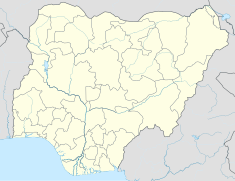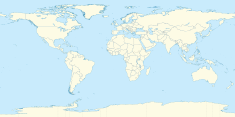Zungeru Hydroelectric Power Station
| Zungeru Hydroelectric Power Station | |
|---|---|
| Country | Nigeria |
| Location | Zungeru, Niger State |
| Coordinates | 09°54′18″N 06°17′32″E / 9.90500°N 6.29222°E |
| Purpose | Power |
| Status | Under construction |
| Construction cost | US$1.3 billion |
| Owner(s) | Federal Government of Nigeria |
| Operator(s) | Zungeru Hydropower Consortium |
| Dam and spillways | |
| Impounds | Kaduna River |
| Turbines | 4 x 175 MW |
| Installed capacity | 700 megawatts (940,000 hp) |
| Annual generation | 2,640 GWh |
Zungeru Hydroelectric Power Station is a 700 megawatts (940,000 hp) hydroelectric power plant under construction in Niger State, Nigeria. When completed, as expected, it will be the second-largest hydroelectric power station in the country, behind the 760 megawatts (1,020,000 hp) Kainji Hydroelectric Power Station.[1]
Location
[edit]The power station is located across the Kaduna River, near the town of Zungeru, in Niger State, in northwestern Nigeria.[1][2]
Zungeru lies about 66 kilometres (41 mi), by road, northwest of Minna, the capital city of Niger State.[3] This is approximately 221 kilometres (137 mi), by road, northwest of Abuja, the capital city of Nigeria.[4] The geographical coordinates of Zungeru Hydroelectric Power Station are: 09°54'18.0"N, 06°17'32.0"E (Latitude:9.905000; Longitude:6.292222).[5] This power station is located between Shiroro Hydroelectric Power Station (upstream) and Jebba Hydroelectric Power Station (downstream).[6]
Overview
[edit]Zungeru HPP is a large energy infrastructure project and at 700 megawatts capacity, is Nigeria's second-largest hydroelectricity power station, behind the Kainji Hydroelectric Power Plant, which has capacity of 760 megawatts.[1]
The design calls for a roller-compacted concrete dam measuring 233 metres (764 ft) in length and 101 metres (331 ft) in height. This will create a reservoir capable of storing "10.4 billion m3 of water".[1][6]
The energy generated will be evacuated via two high voltage lines: (a) a 132kV line to Kainji Dam and (b) a double circuit 330kV line to connect to the line between Shiroro and Jebba dams. The power will subsequently be integrated into the Nigerian electricity grid.[6]
Construction
[edit]The project cost has been reported as 1.3 billion US dollars. Of that, 25 percent is sourced from the Federal Government of Nigeria, and 75 percent is a loan from the Chinese government, through the Exim Bank of China. Construction started in 2013, with an initial completion date of 2018.[1][7]
The engineering, procurement, and construction contract was awarded to a Chinese consortium comprising China National Electric Engineering Company (CNEEC) and Sinohydro. A new completion date has been reported to be December 2021.[1][8]
In January 2022, Afrik21.africa reported that Zungeru HPP would be commissioned in phases during 2022. It is expected that the first turbine, with generation capacity of 175 megawatts would come online during the first quarter of the year. The next turbine, with equal capacity, would then follow the first, after approximately ninety days, and so on, until all four turbines are installed for maximum generation capacity of 700 MW. The power station would add 2,640 GWh to the Nigerian grid, annually. This is equal to approximately 10 percent of installed national generation capacity, as of January 2022.[9]
Youth protest
[edit]Over 1,000 youth led by Bello Sheriff, protested by holding a demonstration on the Kontagora–Minna Road, over the deplorable state of the roads in the area. The protesters held banners and posters, including those that read: "We are suffering because of bad roads" and "Power state without power". The protesters insisted that their demands must be met.[10][11][12]
Displaced settlers
[edit]When Senator David Umaru visited the IDP camp in Zungeru, he sympathized over the victims for the delay in payment. The senator said 2 billion naira was given by Nigerian Federal Government to Niger State Government for the resettlement of affected people in the community.[13]
The Nigerian vice president Yemi Osinbajo, on a visit to the Hydroelectric station promised the 500 displaced settlers that are settled in a new location in New Gungu Wushishi with an immediate effect of the payment.[14]
Developments
[edit]In early November 2022, the Federal Government of Nigeria advertised the first stage of the two-phased process of selecting the concessionaire who will operate, manage and maintain the power station for the first 30 years of its commercial life. The first phase is intended to prequalify applicants, while the second stage would evaluate the short-listed firms based on their detailed bids. Consortia were also invited to apply. At that time, the power station was about 96 percent complete, with commercial commissioning planned in the first quarter of 2023.[15] Nigerian media reported completion of construction in November 2023.[16]
In February 2023, the Nigerian government selected Mainstream Energy Solution Limited, a Nigerian company, as the concessionaire for this power station. Mainstream will operate and maintain this power plant for thirty years, paying a fee of US$70 million annually to the government.[17]
References
[edit]- ^ a b c d e f Jean Marie Takouleu (30 March 2021). "Nigeria: BPE To Concession Zungeru Hydropower Plant (700 MW)". Paris, France: Afrik21.africa. Retrieved 1 April 2021.
- ^ Power-Technology (2019). "Zungeru Hydropower Project". Power-Technology.com. Retrieved 1 April 2021.
- ^ "Road Distance Between Minna, Nigeria And Zungeru, Nigeria" (Map). Google Maps. Retrieved 1 April 2021.
- ^ "Road Distance Between Abuja, Nigeria And Zungeru, Nigeria" (Map). Google Maps. Retrieved 1 April 2021.
- ^ "Location of Zungeru Hydroelectric Power Station" (Map). Google Maps. Retrieved 1 April 2021.
- ^ a b c Chidi Ugwu (17 March 2019). "700MW Zungeru Power Project: Why FG Deploys New RCC Technology". Independent Nigeria. Lagos. Retrieved 1 April 2021.
- ^ Comfort Dafe (15 March 2018). "Zungeru hydro dam 45% completed, says FG". The Guardian (Nigeria). Lagos. Retrieved 1 April 2021.
- ^ Femi Asu (28 October 2019). "$1.29bn Zungeru hydropower project 68% completed –Ministry". The Punch. Retrieved 1 April 2021.
- ^ Jean Marie Takouleu (10 January 2022). "Nigeria: Zungeru Dam to be commissioned in four phases from the first quarter of 2022". Afrik21.africa. Paris, France. Retrieved 14 January 2022.
- ^ Isa Isawade (7 November 2019). "Zungeru Dam: Host Communities Protest Bad Roads". PMNews Nigeria. Lagos. Retrieved 1 April 2021.
- ^ Justina Asishana (7 November 2019). "Minister cancels trip to Zugeru dam over youth protests". The Nation (Nigeria). Mushin, Lagos State, Nigeria. Retrieved 1 April 2021.
- ^ Enyioha Opara (8 November 2019). "Minister cancels visit to Zungeru Dam over protests". The Punch. Lagos. Retrieved 1 April 2021.
- ^ Ojo Adejole (18 September 2018). "Commence Payments of N2bBillion Compensation to Zungeru Communities FGNigeria Told". Blueprint Newspaper. Abja. Retrieved 1 April 2021.
- ^ Ahmed Tahir Ajobe (28 June 2019). "Nigeria: Displaced Hydro Dam Community Still in Tents 7 Months After". Daily Trust. Abuja. Retrieved 1 April 2021.
- ^ Oge Udegbunam (1 November 2022). "Nigeria invites bids for Zungeru hydropower plant concession". Premium Times. Abuja, Nigeria. Retrieved 5 November 2022.
- ^ Mary Izuaka (8 November 2023). "Zungeru hydropower plant to begin operation November – Minister". Premium Times. Abuja, Nigeria. Retrieved 4 February 2024.
- ^ Camillus Eboh and Josie Kao (22 February 2023). "Nigeria gives power concession to local firm at $70 mln a year". Reuters.com. Retrieved 4 February 2024.
External links
[edit]- Advisory services sought for concession of Zungeru hydropower plant As of 25 March 2021.



